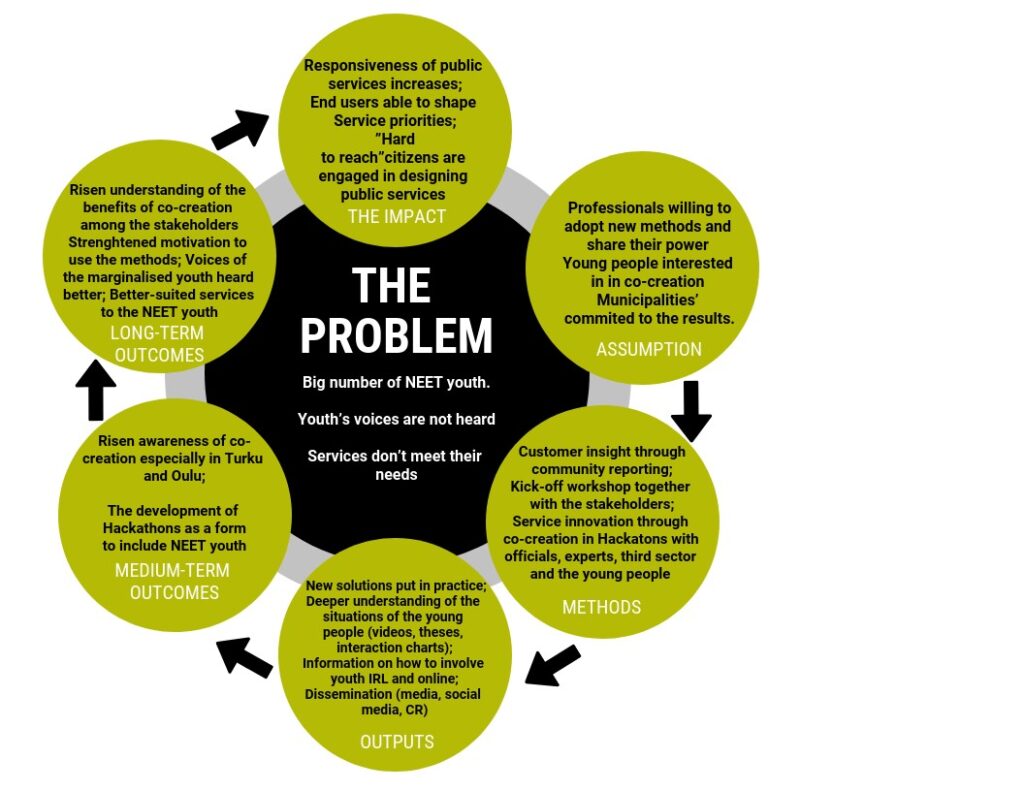Objectives and co-creation aspects
The Finnish pilot is called ‘Youth co-empowerment for health and wellbeing through social media’ and covers social services for young people excluded from work, education and training (so called NEETs). The aim is to test and create new improved ways to involve young people in order to increase their participation in society and to decrease exclusion.
The pilot addresses the problem of services that still do not very well match the youth needs. as still many youth struggle with unemployment, lack of education, mental health problems, lack of hobbies, bullying, inability to act, and loneliness (National Health Survey of pupils in primary and secondary schools, Halme et. al. 2018). Moreover, there is a lack of efficient ways to reach marginalised young people and the voice of marginalised youth is not heard enough in the society.
In the CoSIE project overall, and the Finish pilot, the long-lasting change we are aiming at is that the responsiveness of public services is enhanced, end users are able to shape the service priorities, and so called hard to reach citizens engage more in the design of public services. In the Finnish pilot, the final goal is to create organisational impact: that the professionals in different fields, especially those related to NEET young people, and the decision-makers firstly realise the benefits of co-creation and secondly are willing to use the elements and tools of co-creation in the future. We see the decision-makers as an important part of the long-term goal, as they are the key to the funding different actions, although a lot can also be done without extra funding. We are measuring long-term change with interviews to participants and key actors in the city of Turku, and analysing, how effectively we are able to disseminate our results to other municipalities.
Co-creation: focusing on needs for co-design
The pilot has departed from design thinking based on hearing citizen voices and such principles as cross-sectoral thinking and multi-actorship, as not only as the key concepts in co-creation but understood also as key procedures to effectiveness, as the problems young people face are multiple and linked to each other.
A key problem that has been raised by various discussions with grass-root workers is that the voice of young people was not heard enough. Very often adult professionals speak on behalf of young people. That is why the pilot partners have all the time kept in mind the importance of hearing young people’s opinions straight from themselves.

The results
- The developed profiles have been very helpful also for other purposes outside of the project. They are concrete and illustrate the complex nature of the marginalisation.
- Also a novel cloud based software application is being developed in TUAS to empower the researchers and developers working in organisations providing public services. It serves as a way to reach those, who do not want to participate workshops and other activities as a way to broaden the pool from where the information and e.g. experiences about services is derived.
- A training course about how to encounter a young person as a customer developed in cooperation with TUAS lecturer and students and a NGO called ‘Kaupunkilähetys’ and its youths’ development panel. The training is now led by young people. It consists of self-reflection questionnaire as a starting point and then, discussions in small groups. These discussions are about different themes linked to encounters with youth, and the groups are steered by youths. The training was piloted with TUAS students (bachelors of social services) and the city of Turku has been willing to buy this training for professionals in several sectors, such as vocational teachers and employment service officers. TUAS or ‘Kaupunkilähetys’ will not benefit, but the young people involved get a reward from their work.
Read more about the pilot at the Cosie project homepage